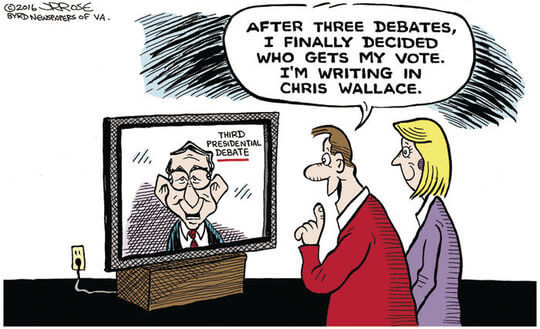 The moderator of this debate, Chris Wallace of Fox News, was by far the best moderator we’ve seen this season in my opinion. He largely stuck to the topics, asked good questions, kept the candidates in line, and even kept control of the audience. Wallace selected the topics himself. They were the economy, the Supreme Court, foreign hot-spots, immigration, debt and entitlements, and fitness to be president. The candidates (and public) were told what the topics were in advance, but not what the questions would be.
The moderator of this debate, Chris Wallace of Fox News, was by far the best moderator we’ve seen this season in my opinion. He largely stuck to the topics, asked good questions, kept the candidates in line, and even kept control of the audience. Wallace selected the topics himself. They were the economy, the Supreme Court, foreign hot-spots, immigration, debt and entitlements, and fitness to be president. The candidates (and public) were told what the topics were in advance, but not what the questions would be.
There was a single occasion where I thought Wallace injected himself inappropriately into the debate, which I will discuss below. However, apart from that, I have nothing but praise for Wallace, and I hope the debate commission uses him again in the future.
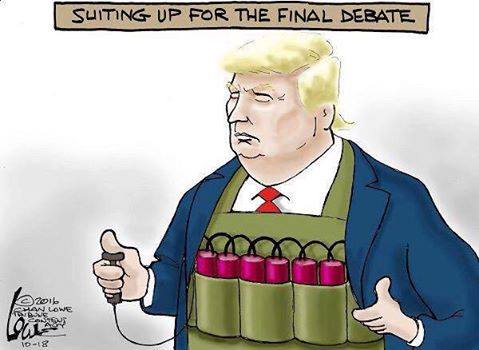 By the day after this last debate, I already felt like everything had already been said. Before it began, we knew what both Donald Trump and Hillary Clinton had to do if they wanted to win. Trump had to appear presidential and stick to the issues. He needed to try and get back all the suburban women voters he’s lost in the last couple of weeks and try not to upset anyone else if he was to have any chance of even coming close to winning the election. Most of those who are still undecided actually lean Republican and the reason for this is obvious – they’re former GOP supporters who are desperately trying to find a way they can justify supporting someone like Trump. It wouldn’t take that much to persuade these people. As we now know though, he didn’t manage it.
By the day after this last debate, I already felt like everything had already been said. Before it began, we knew what both Donald Trump and Hillary Clinton had to do if they wanted to win. Trump had to appear presidential and stick to the issues. He needed to try and get back all the suburban women voters he’s lost in the last couple of weeks and try not to upset anyone else if he was to have any chance of even coming close to winning the election. Most of those who are still undecided actually lean Republican and the reason for this is obvious – they’re former GOP supporters who are desperately trying to find a way they can justify supporting someone like Trump. It wouldn’t take that much to persuade these people. As we now know though, he didn’t manage it.
There are actually plenty of things Clinton and the Democrats can be either challenged on or on which different policies can be presented that would appeal to those people. He just had to talk about them. However, he has mainly stuck to his own game plan – simply maintaining the narrative that Clinton is “crooked” and a “liar” throughout his campaign. He has been successful at that to the point that most Republicans and many Democrats do not even question it, but it has not attracted enough new voters to the Republican brand to win an election.
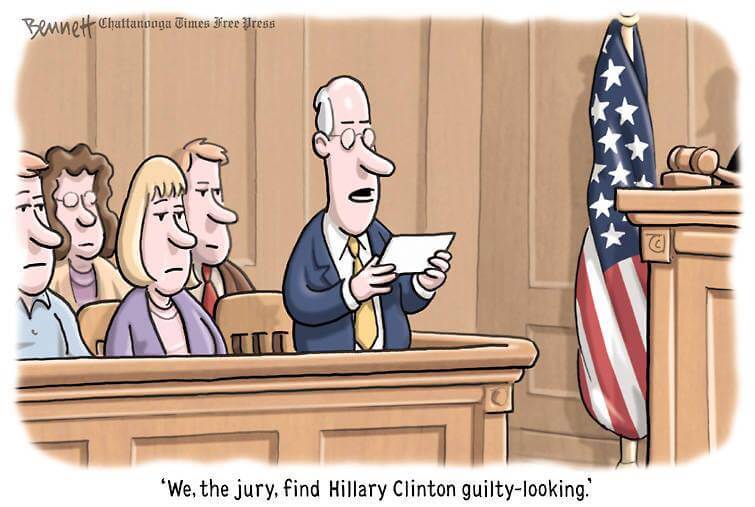 Clinton on the other hand had to take her lead from Trump. If he managed to retain control of his personality, she had to keep the debate on the issues and away from discussion of whether or not she was honest. If he lost it, she really just had to let him go and provide a comparison for viewers as to who was the more presidential.
Clinton on the other hand had to take her lead from Trump. If he managed to retain control of his personality, she had to keep the debate on the issues and away from discussion of whether or not she was honest. If he lost it, she really just had to let him go and provide a comparison for viewers as to who was the more presidential.
For the first thirty minutes, Trump did well. The first question from moderator Chris Wallace was on the Supreme Court and what type pf appointments each candidate would make. Both largely stuck to party lines. On abortion Clinton expressed her support for a woman’s right to choose and the maintenance of Roe v. Wade. While not actually saying that he supported the abolition of Roe v. Wade, Trump did say that he thought that would happen “automatically” under his regime because he would appoint judges that didn’t support the current ruling. He also used a lot of emotive and manipulative language about ripping babies limb from limb on the day before birth. Trump and those around him don’t realize that most women, even if they are anti-abortion themselves, don’t want Roe v. Wade overturned. I don’t think the candidates’ answers will have moved the needle much and if it did, it would have been in favour of Clinton.
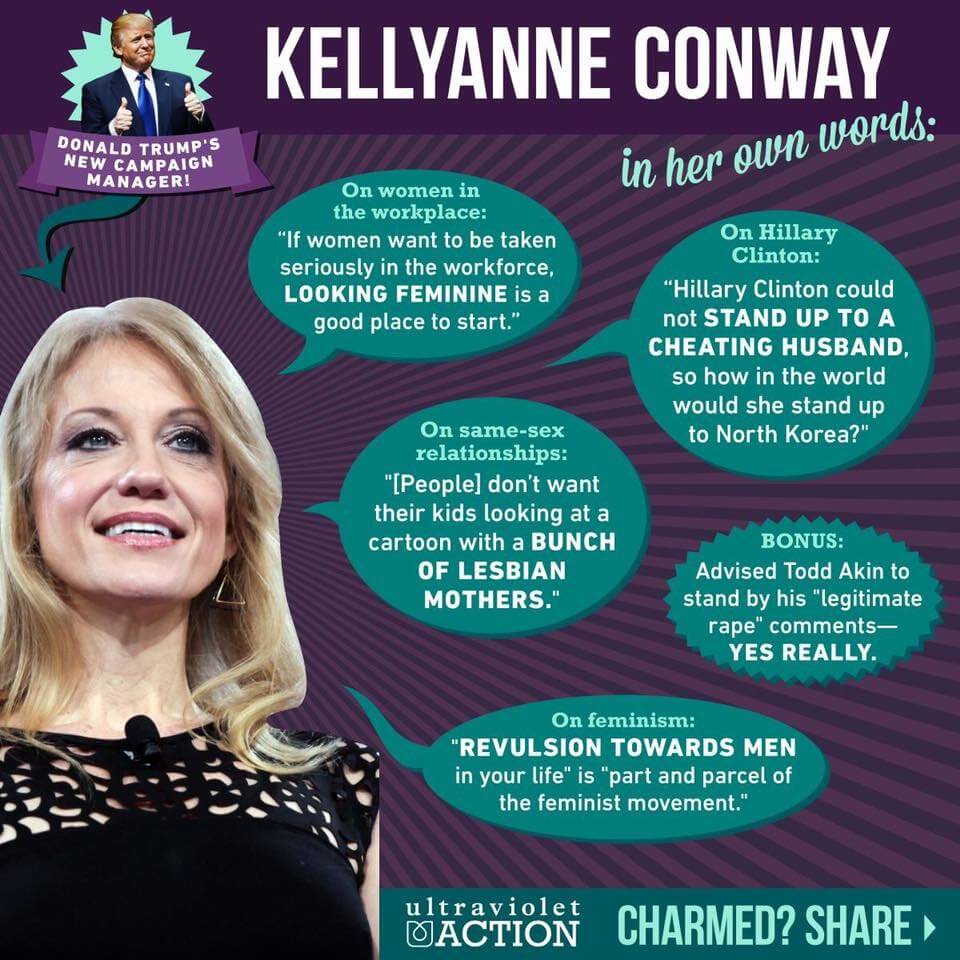
The 2nd Amendment was also discussed in this segment. Trump didn’t offer anything concrete – all he really said was that if Clinton became president, the 2nd Amendment would become “a very, very small replica of what it is now” and that the NRA supported him. Clinton did something which annoys the heck out of me, but which most people like and is a vote winner – she introduced an anecdote about real people. She declared her commitment to maintaining the 2nd Amendment but talked of her wish to close loopholes to ensure that those who shouldn’t have access to firearms, didn’t. Again, Trump would have geed up his base but not attracted any new voters.
Immigration was the next topic up. Again Clinton used the trick of talking about real people while Trump used a phrase that has had a lot of attention since – he referred to the “bad hombres” that are dealing drugs and that he intends to get rid of. He also accused Clinton of wanting open borders, a claim that Politifact has rated “Mostly False.” This talk is the sort of thing his base likes to hear, but if he still held out any hope of attracting Latino voters, this was probably the end of it. Clinton did further damage to Trump by managing to insert the fact that undocumented workers had been used to build Trump Tower in New York.
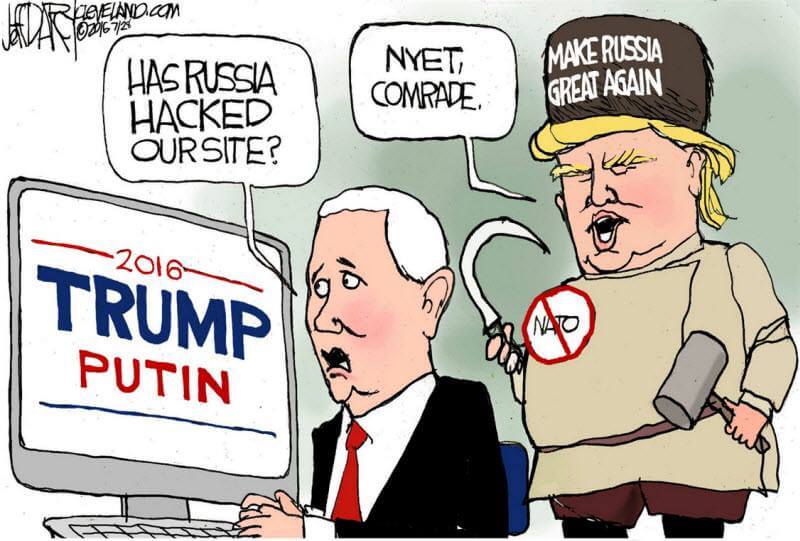 This segment veered off topic to relations with Russia. Trump continued to side with Putin who has denied that Russia had anything to do with the recent major hacking episodes. This is despite the Director of National Intelligence James Clapper coming out and stating publicly that Russia was the source of the hacking. The line that Trump has taken on this is quite unsupportable and now that even Clapper is announcing it publicly, it is time for him to accept it as fact. As Clinton said:
This segment veered off topic to relations with Russia. Trump continued to side with Putin who has denied that Russia had anything to do with the recent major hacking episodes. This is despite the Director of National Intelligence James Clapper coming out and stating publicly that Russia was the source of the hacking. The line that Trump has taken on this is quite unsupportable and now that even Clapper is announcing it publicly, it is time for him to accept it as fact. As Clinton said:
We have 17 intelligence agencies, civilian and military, who have all concluded that these espionage attacks, these cyberattacks, come from the highest levels of the Kremlin and they are designed to influence our election.
Trump appears unable to admit when he is wrong, and that is a very dangerous character flaw in a president. We saw another example of that recently with him continuing to insist the Central Park Five are guilty despite DNA evidence clearing them.
I saw an interview on CNN (Friday evening US time/Saturday afternoon NZ time) that Anderson Cooper did with Univision‘s Jorge Ramos, the influential Latino journalist that Trump kicked out of a press conference in August last year. He stated that Latinos were very unhappy with the negative stereotype that Trump presented with the “bad hombres” line. Apparently there was also some problem with Trump’s pronunciation (he actually said “bad hungry”) and grammar as well. Trump is already doing badly with Latino voters – only 17% support him while 70% support Clinton – and with the changing demographics of the US electorate, it’s all but impossible to win the White House without at least double the support among Latinos that he has.
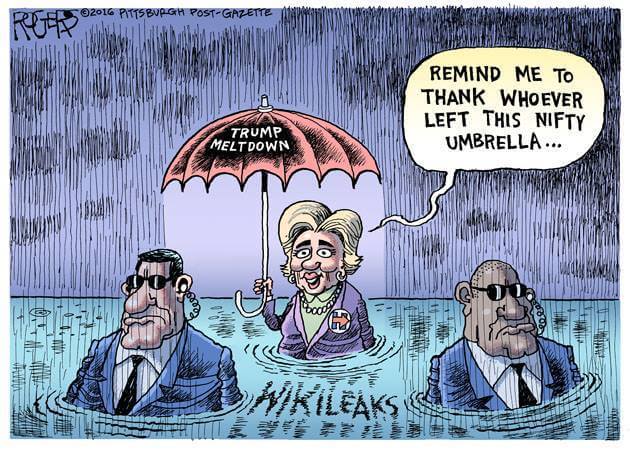 As someone who would rather see Clinton president than Trump, I was concerned during the initial thirty minutes. There was nothing wrong with Clinton’s performance, but there was nothing wrong with Trump’s either. Given that those undecided women and recent Trump defectors are the ones he needs, there was a good chance he could get them back with the way he was going. He remained calm, he answered reasonably well, he didn’t allow himself to be baited, and he didn’t interrupt. Given the low bar everyone set for him, he was succeeding well. However, I needn’t have worried. As the first two debates showed, he’s not capable of maintaining even a semblance of respectable behaviour despite the circumstances for any longer than half an hour.
As someone who would rather see Clinton president than Trump, I was concerned during the initial thirty minutes. There was nothing wrong with Clinton’s performance, but there was nothing wrong with Trump’s either. Given that those undecided women and recent Trump defectors are the ones he needs, there was a good chance he could get them back with the way he was going. He remained calm, he answered reasonably well, he didn’t allow himself to be baited, and he didn’t interrupt. Given the low bar everyone set for him, he was succeeding well. However, I needn’t have worried. As the first two debates showed, he’s not capable of maintaining even a semblance of respectable behaviour despite the circumstances for any longer than half an hour.
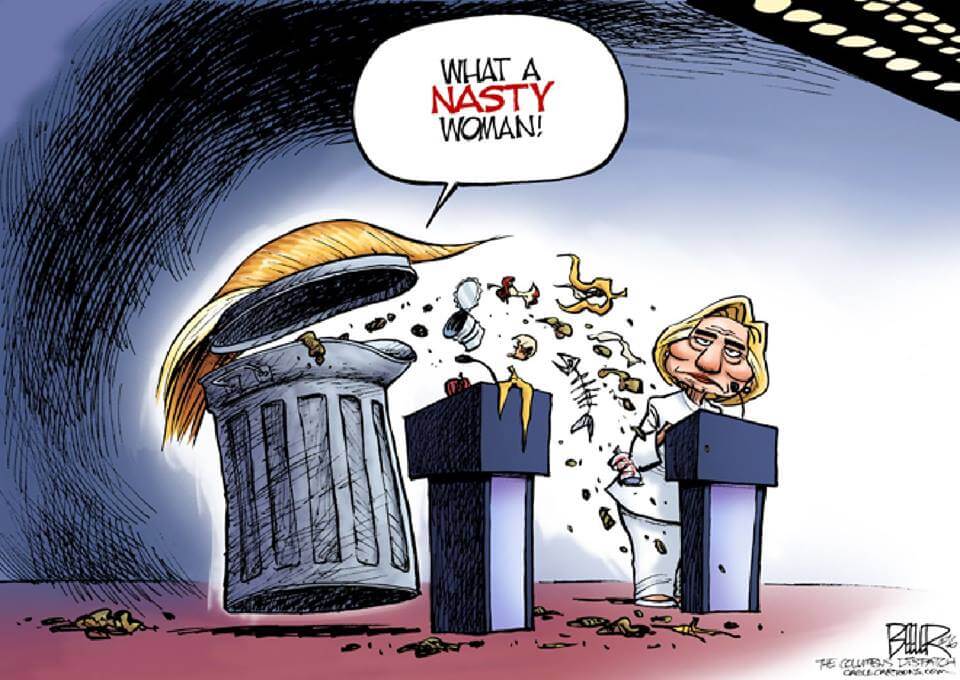 In fact not only did Trump implode, he gave the pundits two more quotes that will be played over and over again whenever the United States is holding presidential debates in the future. Firstly, while Clinton was answering a question about taxes, she got a dig in about Trump not paying his own, which is something he’s repeatedly says makes him “smart.” He leaned into the microphone, so nobody could miss it, and said, “Such a nasty woman.” Again, this is not behaviour that will attract women voters. (The second was towards the end of the debate – I’ll get to it!)
In fact not only did Trump implode, he gave the pundits two more quotes that will be played over and over again whenever the United States is holding presidential debates in the future. Firstly, while Clinton was answering a question about taxes, she got a dig in about Trump not paying his own, which is something he’s repeatedly says makes him “smart.” He leaned into the microphone, so nobody could miss it, and said, “Such a nasty woman.” Again, this is not behaviour that will attract women voters. (The second was towards the end of the debate – I’ll get to it!)
The economy came next, and this was the one part where I considered there was a question where Chris Wallace came unstuck. He asked:
Secretary Clinton, I want to pursue your plan, because in many ways it is similar to the Obama stimulus plan in 2009, which has led to the slowest GDP growth since 1949.
Obama’s stimulus plan was not able to be fully enacted because of GOP obstruction. My own opinion, which is supported by multiple economists, is that if the plan had been carried out in full, GDP would have grown much faster than it did. Further, although growth was slow, it was faster than most of the rest of the developed world. Therefore, I thought this question showed Wallace’s personal bias on the topic, though overall I do not think he showed a preference for either candidate.
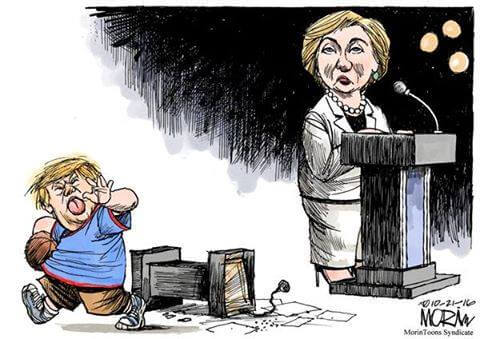 During the Economy part of the debate Trump did briefly settle again for about five minutes, probably due to his personal confidence on the topic. This was a section in which Trump should have been able to do well. However, it was Clinton that shone, and that showed in the results of the post-debate CNN/ORC poll. The economy is the one are in which Trump regularly outperforms Clinton in polls, but she won this one 50% to 48%.
During the Economy part of the debate Trump did briefly settle again for about five minutes, probably due to his personal confidence on the topic. This was a section in which Trump should have been able to do well. However, it was Clinton that shone, and that showed in the results of the post-debate CNN/ORC poll. The economy is the one are in which Trump regularly outperforms Clinton in polls, but she won this one 50% to 48%.
Clinton was able to describe her jobs plan, which isn’t that different to Trump’s actually, but he didn’t talk about his at all. Once it was pointed out by Clinton that his tax plan mostly helped the wealthy and added significantly to the national debt and deficit, he seemed to lose it. He managed to get in the fact that she had lied at the previous debate about calling the Trans-Pacific Partnership the “gold standard,” but Clinton just carried on as if he hadn’t spoken. He also reintroduced an old claim about the State Department losing US$6 billion while she was in charge, which has previously been identified as a “Pants of Fire” lie by Politifact.
A segment on “Fitness to be President” followed which naturally included reference to Trump’s behaviour towards women. He did himself no favours and didn’t manage to get any of the hits against Clinton he could have. Among other things, he made the ridiculous assertion that the allegations made against him in recent days “have been largely debunked.” As well as this, Clinton referred to Trump being sued for racial discrimination (a case he settled out of court) and the occasion when he made fun of a disabled reporter. Trump interrupted to tell everyone he hadn’t done that, which didn’t go over too well with the audience – it’s common knowledge that he did do that and lying about it doesn’t help. The Clinton tactic of just ignoring it and carrying on works much better in debates.
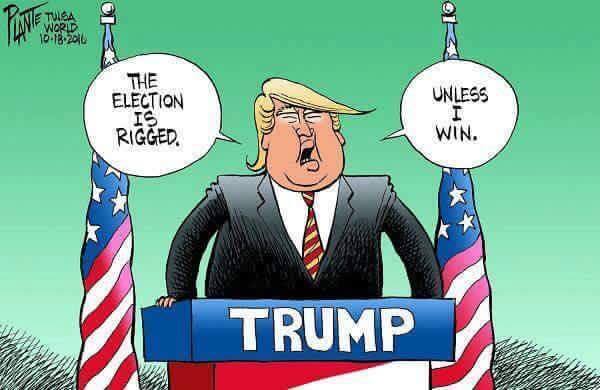 The second major “quotable” came in this part of the debate. Trump was questioned about his ongoing pronouncements at his rallies that the election is rigged and asked whether he would accept its result. He said he “might not accept” the result, that he couldn’t answer the question, and that he would keep us “in suspense.”
The second major “quotable” came in this part of the debate. Trump was questioned about his ongoing pronouncements at his rallies that the election is rigged and asked whether he would accept its result. He said he “might not accept” the result, that he couldn’t answer the question, and that he would keep us “in suspense.”
He clarified his position at a rally the next day: he announced he would accept the result of the election if he won. As usual, his supporters are making excuses for him, explaining his answer away, telling us what he really meant, or that his answer was “tongue in cheek.” But given the regularity with which he repeats it, none of those excuses holds water.
Trump’s constant undermining of the electoral system should, in my opinion, be enough to demonstrate that he is unfit to be president without all the other aspects of character and behaviour being exposed, and in any other year they probably would be.
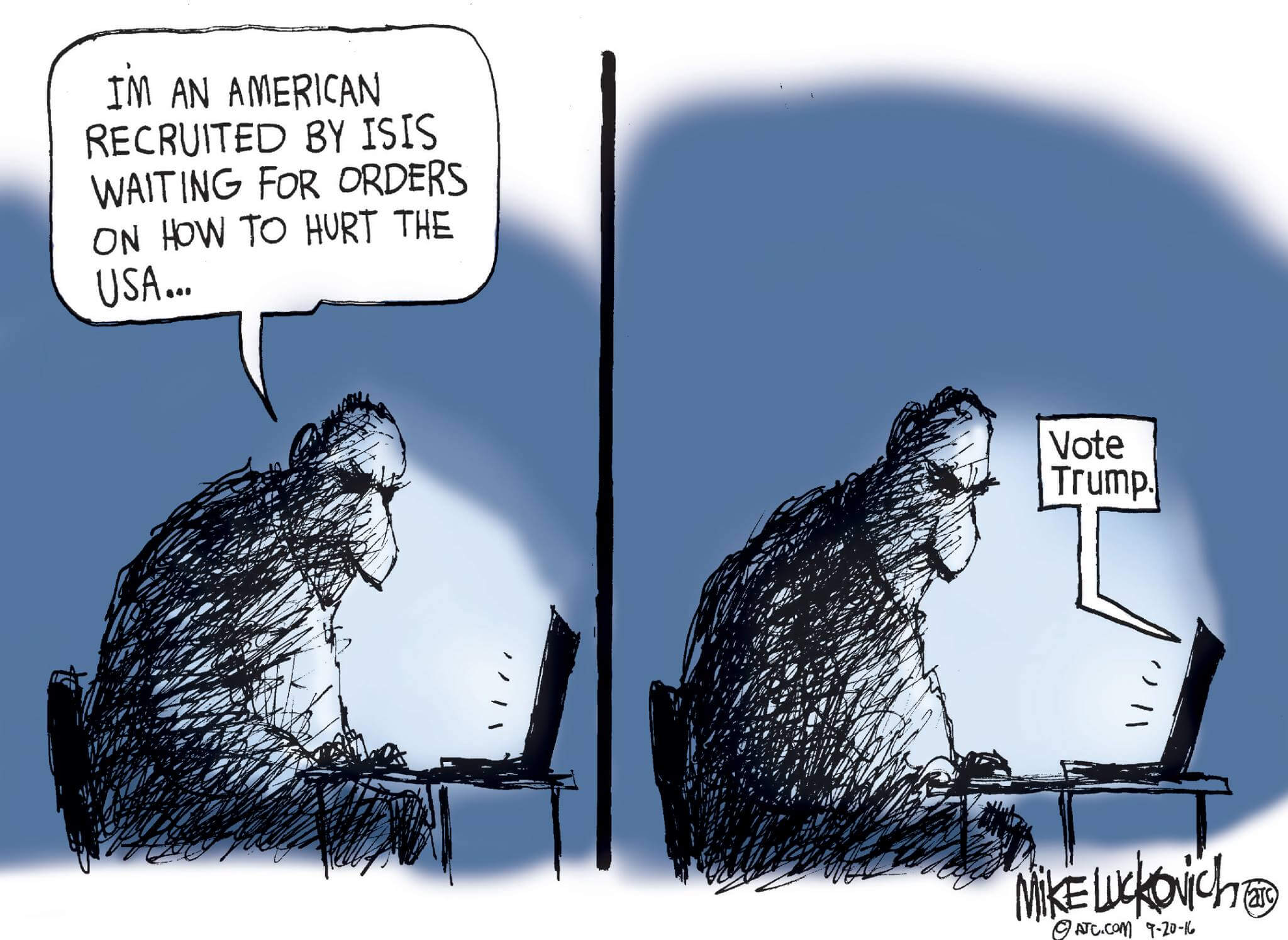 Foreign hot-spots came up next, and the main topics discussed were Mosul and Raqqa, though neither at length. Unbelievably, Trump once again claimed that he had never supported the Iraq war. Trump still hasn’t worked out that there are many good reasons why the military would announce the battle for Mosul beforehand, but I doubt many of his supporters have either. Most of the educated women he needs to get to vote for him probably do though, so once again he achieved nothing. However, the segment was short and Clinton did not get the opportunity to demonstrate her expertise in this area.
Foreign hot-spots came up next, and the main topics discussed were Mosul and Raqqa, though neither at length. Unbelievably, Trump once again claimed that he had never supported the Iraq war. Trump still hasn’t worked out that there are many good reasons why the military would announce the battle for Mosul beforehand, but I doubt many of his supporters have either. Most of the educated women he needs to get to vote for him probably do though, so once again he achieved nothing. However, the segment was short and Clinton did not get the opportunity to demonstrate her expertise in this area.
The CNN/ORC poll following the debate once again gave it to Clinton 52% to 39%. The gap between them on debate performance has thus continued to reduce. Trump definitely had improved from the 2nd debate, but not by enough to claw back his previous losses or improve his standing in the polls. A significant result from the CNN/ORC poll was that 59% thought that Clinton was better prepared to be president while only 35% thought Trump was – that means that more people thought Clinton was better prepared than who thought she won the debate. As for who understood the issues better, Clinton won 61% to 31%.
In other categories, the two scored fairly equally except on foreign policy:
Who agreed with you most on important issues? Clinton 50%, Trump 47%
Who was more sincere and authentic? Clinton 46%, Trump 47%
Who would better handle Supreme Court nominations?: Clinton 48%, Trump 49%
Who would handle the Economy better?: Clinton 50%, Trump 48%
Who would handle the Federal Budget better?: Clinton 50%, Trump 46%
Who would handle Foreign Policy better?: Clinton 55%. Trump 41%
This is my current prediction for the election:
There are some states I’ve turned blue that I’m not sure of, especially Nevada, Utah and Arizona, but there’s time to change my guesses yet, and three weeks is a long time in politics. What do you think will happen?
If you enjoyed reading this, please consider donating a dollar or two to help keep the site going. Thank you.

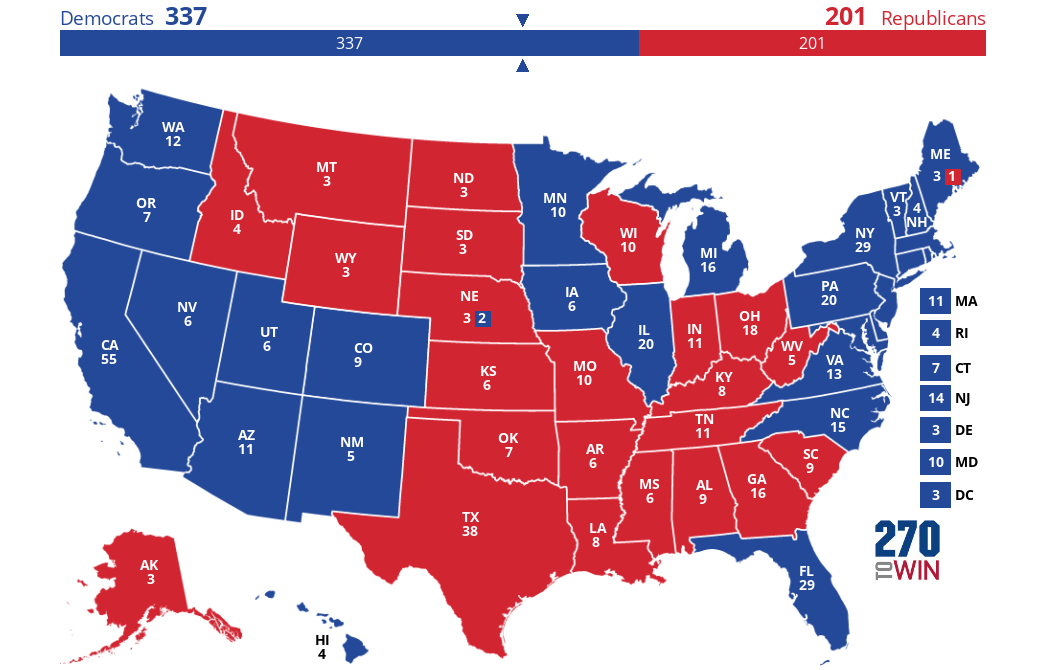
 Click the map to create your own at
Click the map to create your own at
Small typo: “Trump not paying his…”
Thanks Rick. Fixed. It’s actually the way NZers talk, but I can see why it’s confusing so I’ve changed it. 🙂
Good write up Heather. I just have to add that I am stunned that the CNN/ORC poll shows the candidates so close. After following the campaign closely all year, it’s hard to imagine so many people willing to say Trump is in the least bit qualified. I’m recalibrating my estimation of the ability of the American public to govern themselves. Thomas Jefferson, who said the republic would stand only as long as the people were well educated, is rolling in his grave.
Perhaps the definition of “well-educated” needs to be looked at. There’s no doubt the US has many of the best schools in the world, and their top students are still amongst the top in the world, so I’m not really sure what’s going wrong from a distance.
When I watch things like CNN interviewing people at Trump rallies I wonder how many of those people graduated high school as their ability to assess information and make rational judgments does seem to be lacking. The people they interview don’t seem to so much lack intelligence as the ability to use it. (That all sounds very pretentious and condescending, but I’m trying not to sound too rude about the people of another country.) I’d be interested to know what USians think of schools over there. They can’t be all bad, as obviously tens of millions of people come out of them just fine. Is there a big difference state by state?
I don’t know the answer to your questions Heather. But, here are some thoughts: The system works very well for some – especially at the elite college level. Primary and secondary schools, not so much. Here in my neighborhood, you have a city district which is quite poor and has a very high black and latino student population. In the suburbs there are varying levels of quality, but they are all better than the inner city. The most elite high school system is a small suburb with a high concentration of IBM engineers, and professional families. This neighborhood was established in the 1950s when IBM was expanding here and bringing in educated workers. White flight as they refer to it.
Each district has funding which is largely based on property taxes, so you can see where the financial disparity comes from. Likewise state funding varies considerably between states. Historically, States like New York, Michigan and California have done well supporting schools, whereas Mississippi, Arkansas and West Virginia with less healthy economies do less well.
A big complaint here is that kids do not seem to emerge from school with a good understanding of how a republic is supposed to function, even though they take mandatory civics courses. They also seem to lack critical thinking skills to allow them to make good choices.
Perhaps the answer is federal funding of schools at and equal level across the country, and a revised curriculum with a stronger emphasis on decision skills.
“Civics” reeks of patriarchy and white/Western/Christian supremacy, so it was banned from government-run schools along with prayer, and replaced with sensitivity training and leftist indoctrination.
Sounds to me that you were home schooled.
We fund schools quite differently, and I have to say I think funding schools via property taxes is incredibly unfair. In NZ all schools get the same basic funding, which is adjusted depending on several factors. For example, schools in poorer areas get more funding than schools in wealthy areas the assumption being that schools in wealthy areas can more easily fund raise from their communities. Also, schools who have more high needs kids, for example, get more funding.
Basically there’s an attempt to try to make sure all kids get an equal chance, whatever their background.
My bags are packed. Now if they will only let me in I promise to be a good citizen of NZ. 😎
If you’ve got skills we want, you’d be welcome. We’ve been growing a lot via immigration in the last few years because we’ve become one of the few places left that are peaceful and largely unaffected by terrorism, ultra-nationalism, and fascism. Even politicians from opposing parties get along most of the time.
I think you can get in just by depositing a large amount in a NZ bank too and promising to maintain the balance as long as you’ve got a good character. (The assumption is you’ll spend money which will help the economy.)
I make a distinction between “educated” and “trained”. Ben Carson is a very talented well trained pediatric neurosurgeon, but I hardly think of him as educated. He has poor critical thinking skills and is not well versed in the Humanities. My generation (boomer) rebelled against all those “irrelevant” courses in college, which ultimately was translated into teaching mostly that which will enhance one’s career and pursuit of wealth – at the expense of appreciating the human condition and the need to have empathy for our fellow human beings. And the critical thinking skills to recognize the wisdom of improving the overall human condition instead of clawing one’s way to financial success.
So while we do have excellent training academies (some of which do have good courses of study in the Humanities but they must be looked for), it is not common to receive a thorough, well-rounded “education” in the model of what a University initially was. Just my opinion.
That’s a good point – educated vs trained. Educated vs intelligent is another one. Carson is undoubtedly intelligent, but that doesn’t mean he knows stuff, or knows how to think, and knowing how to think is one of the most important things you get from a good humanities education (as you point out). He’s also proof that intelligent doesn’t automatically come with good judgment either.
Thanks, Heather, always great to get your take on all things political.
I liked the way Hillary insisted on having her say when being interrupted and even a few times when Wallace was trying to butt in. I thought in this debate she was far more forceful and clearly not going to brook any nonsense.
Question–did anyone see the vids of the Al Smith dinner held the very next day? Short vid of some of the zingers from both candidates:
http://nyti.ms/2emr63t
I was floored to see such conviviality right after such a bitter debate. Politics! Despite the appearance of that highlight vid, though, I understand that Trump got less and less good-humored as the night wore on, till he was his typical glowering self.
(I know they have speech writers–but I thought Trump actually did a great job delivering the Melania joke.)
Politicians are actors. Hillary learned from one of the best, her husband (by best I mean worst). Trump is an actor performing the role of Donald J. Trump.
AKA about the worst performance as a presidential candidate ever.
That’s the genius of it, isn’t it? Americans love an action movie whose hero breaks every rule and horrifies polite society.
Neither genius nor hero, just a sad spectacle.
If he saves America from the monster of Chappaqua, he will be deemed both.
The entire point is that such a sad excuse for a candidate isn’t going to save anyone from anything.
Before television some of the greatest presidents have been poor public speakers. Jefferson could barely speak above a whisper and sometimes sent his speech to be read rather than deliver it. Lincoln had a thin voice. I wonder if some of the best potential candidates in the modern era are lost to us because of the “acting” requirement.
Rachel Maddow had a cute take on the Melania joke. She pointed out that it was plagiarized from a cartoon published earlier. So, a joke involving plagiarism was plagiarized. 😎
Ooh, meta! 😀
Yeah, I saw it. They both got some pretty good zingers in but personally, I thought some of Trump’s “jokes” went over the line. One of those was when he said something about Clinton pretending not to hate Catholics – that was a bridge too far. His Melania joke was probably the best from either though.
Trump got booed several times, and it was on those occasions when he went too far. He went beyond skating close to the edge and into nasty a few times imo.
Hey, thanks for saving me the trouble of watching the whole event. 😀
(I’ve only seen that “highlights” clip.”)
Sad. Wallace never asked about a registry of people who have been abducted by aliens and some who have even had their privates fondled. How are we supposed to shop for real estate?
It’s tragic enough that the way debates are won or lost is through rhetorical zingers. The pundits who follow-up make further base their assessment on meditating on how low information voters digested bluster and body language. This singularly serves to compound the initial problem.
My point is that a moderator can now get away with a question premised on rubbish should be unacceptable, and not a quirk to be brushed off. The question about the stimulus being a failed policy was just such absolute rubbish. If you were to poll the top members of the American Economic Association, you’d get a near unanimous view that the scale of the recession was epic, that the stimulus worked, that the U.S. outperformed most other OECD nations similarly afflicted, and that ideally the stimulus should have been three times bigger and that state and federal should have been co-ordinated in its implementation. Greg Manikiw be damned. The consensus among eminent economists is crystal clear and has been reported numerous times. Any moderator with a modicum of integrity would base any stimulus question on this premise.
If there’s one area that fares worse then the sphere of economics is that of science. Here the sin of omission was even worse than the sin of omission and that climate change was not addressed is inexcusable.
One may claim that Wallace came across with an eloquent and tough demeanor. That’s about it. The substance of his questions had an inverse relationship to the magnitude of the true problems that afflict us.
I’m inclined to give Wallace a pass on this. He may have known more about the stimulus than he let on. Hard not too. But the question can be seen as an offer to Clinton to set the record straight for the low information general public. It was up to her to address the confusion in the question. A softball question really. I don’t remember how effectively she answered it but I think she did point out the extreme depth of the recession and the fact that recovery is still underway.
I agree with you about the question on the economy, as my post indicates, but other than that I think Wallace was pretty fair. Clinton did better than Trump on all the economy-related questions according to properly conducted polls, and she did mention that Obama was able to fully enact his stimulus package.
It is disappointing that Climate Change wasn’t discussed. However, I can think of an excuse for not doing that – opinions in the US are pretty set and polarized and everyone already knows exactly where both candidates stand. It would not be offering new information for voters, just providing an opportunity for people like me to mock Trump’s position and for deniers to attack Clinton.
Though I agree with your comment about why Climate Change was not discussed, it’s so disheartening that it wasn’t. It is probably the single most important issue of the day, arguably even more than ISIS or the economy. And though I can’t vote (I’m Canadian), everyone has a vested interest in this election. It is unbelievable, to me, that the topic has not been discussed at every debate. It might have brought around a few “undecided” voters, who, although they lean Right, care about the environment and the future of the planet for their children & grandchildren. None of the issues that were discussed are going to matter in the slightest when we can’t breathe, and have no food or water. Or are scrambling to clean up after yet another “100 year” storm.
Love your posts! Keep up the great work.
Thanks Claudia!
It’s interesting – in most other countries when asked what the most important issues are, climate change is right up there at the top. It is only in the US that it barely registers. They have by far the largest proportion of deniers too. The GOP has been pretty successful at getting the subject off the table.
I completely agree with what you say. And ignoring it is going to damage the US economy too. Business all over the world are making major adjustments because of it, and consumers are choosing companies on the basis of their climate change policies. Also, maps show that the US is one of the countries most affected by a rise in sea level.
I think warming does not get raised because it doesn’t benefit either party much to raise it. At least not with so much else at stake. In the US, the good news on this front is that while there are still noisy deniers, not many are listening to them, and big majorities recognize the danger. Much progress is being made by private industry and state governments are also on track. The administration is pushing quietly behind the scenes. No one can predict the outcome, but I have a pretty good feeling we are now turning the ship of state and will eventually succeed. If Trump were to get 4 years( and I’m pretty sure that’s all he would get) to try to slow progress, I think it might not hurt too much as long as the overall trend continues.
That’s really good news. There is one problem though – if Trump gets into government he does have the legal authority to sign an executive order to withdraw the US from the Paris Agreement, and he’s said it’s something he would do on his first day in office. So there is a really big danger to the progress the US is making in a Republican presidency. Cruz said he would do the same. I think we need to hope that there has been enough progress by 2020 that even if a Republican won, they wouldn’t pull the country out of the agreement. The inclusion of the US and China in the agreement is vital to its success, and there’s a high possibility that if the US pulled out, China would too, and it would take an enormous effort to keep India in as well. A quote from this: http://www.newyorker.com/magazine/2016/09/26/president-trumps-first-term
and:
and
Yes, Trump would be a serious setback. I can see he’d probably be voted out in 4 years at which time we’d rejoin the agreement. In the mean time corporate America, and for that matter, corporate China, which have to think ahead, would likely continue as if we were already committed. Best case scenario. Worst case? I don’t want to go there…
I mostly agree with your well-thought and detailed analysis Heather. Thanks!
What I disagree with is that Wallace was unbiased. I know that no moderator (or human) will be completely unbiased, but Wallace was obviously biased, especially in the first round. The first few questions were all wedge issues used by Republicans to rouse their base. We all know what type of Supreme Court each candidate wants, and so abortion is the first wedge mentioned. Then the 2nd Amendment…again, for anyone paying attention, we know where the candidates stand, but Wallace had to bring up another wedge issue. Then, of course, comes immigration, probably the biggest wedge issue during this presidential campaign. I’m glad Clinton was able to describe some of the insanity that Trump’s immigration plan would unleash, but anyone with half a brain has already imagined the Trump scenario. So again, I see the first round as trying to make Trump look like a “good conservative” by asking soft-ball questions revolving around wedge issues that reveal nothing. Thanks for the red meat Mr. Wallace.
As you and others have noted, his stimulus lead-in question was inexcusable. But no surprise coming from a faux news network anchor. And no surprise that a faux news network anchor didn’t bring up climate change. That’s a giant WTF? No debate moderator asked about climate change in any debate and that is a disgrace and a slap in the face to all Americans. And since I’m here ranting, I might as well add that these debates were all ultimately useless, simply because you can’t debate someone who is a pathological liar. I remember taking debate courses in high school, and one way to immediately lose the debate was to lie. Then again, the debates might have been useful in destroying any chances Trump had in winning the election, so that’s something positive.
To touch on a question you asked above, the way NZ funds schools is the correct way to do it. Our property tax funding is just plain stupid. Also, since “No Child Left Behind” our schools have become subjugated to mass testing. So teachers need to teach to the test, not the curriculum of their choosing. This makes education boring for both teachers and students. Civics is not taught anymore either, so kids don’t know anything about unions, why citizens are taxed, what “the commons” are, citizen rights, etc. Some good news came out of Illinois last year when their governor signed a bill that made high school civics a graduation requirement; and he’s a Republican, so maybe there’s hope. And obviously it doesn’t help when the Republican presidential nominee spouts stuff like: “I love the uneducated!”
Oops…I didn’t mean this to be a “reply”. Sorry.
I always thought Civics was a core subject in US schools. One of the criticisms of NZ schools is that it isn’t a compulsory subject here. Depending on the school, we still have Christianity being taught here too.
While I stick by my assessment of Wallace being the best moderator, I think yours and Tumara Baap’s criticisms of him are correct. Another thing I wondered about, but wasn’t sure whether it was Wallace’s fault or whether it was a timing thing he couldn’t control, was that he gave a lot of time to the economy, which is the one area where the public likes Trump’s answers (even though they’re a load of rubbish and don’t stand up to scrutiny) and there was very little time given to foreign policy, which is where Clinton shines. Also, the one part of foreign policy he did go to was “foreign hot spots,” which really means terrorism, and the majority tend to like his overly-aggressive simplistic answers on that as well.
Still, Clinton scored better on both debt and the economy, and slammed him on foreign hot spots, so if it was a tactic, it didn’t work. Preparation is always going show, thank goodness. And it has finally got to the stage that a majority realize she’s more presidential than he is. I’ve noticed Pence and others continually using phrases like “broad-shouldered leadership” which are obviously meant to imply that only a man can be a strong leader. (So much for the conservative darling Margaret Thatcher.)
Sorry for the many typos, should be …THAN the sin of commission. I’m curious whether moderators in other advanced can get away with nonsense on a major national platform. Unfortunately we don’t have a strong presence of a body like BBC in our media landscape. PBS and NPR are under constant assault by right wing politicians. Highest viewership is actually for Wallace’s own Fox News. Fox News cannot even air in Canada or Britain where it runs foul of what is considered news. As Jon Stewart would amply demonstrate on a daily basis, Fox News is a nut-job propaganda outfit. To them government intervention is always bad, so the stimulus can only be yucky. What contributed to this state of affairs is Ronald Reagan’s repeal of the Fairness Doctrine which ensured a measure of responsibility in the airwaves given it is a scarce public resource.
If Fox News was produced in NZ, it wouldn’t be allowed either, or at least it would be spending all its time making public apologies about biased coverage. It makes it onto cable news though by virtue of freedom of speech.
Here, all shows purporting to be news, documentaries etc have to be fair and balanced (which is ironic considering that’s what Fox’s motto is). There is a complaints commission and if a complaint about biased coverage is upheld, the show has to make a public apology, and they can’t bury the apology either. If it’s the 6 o’clock news, they have to lead with the apology. No one wants to be seen as unreliable, so they do a pretty good job of being genuinely fair and balanced.
One should note that his best joke at the Al Smith dinner was at Melania’s expense, not his own. Not really, what shall we say, gentlemanly?
I do not know for sure, but being booed at this dinner, was that a first?
Indeed, the Third Debate showed again that he has no stamina, no willpower, beyond half an hour; no self control, can’t help himself, hence exquisitely and imminently unsuited for the position he’s aspiring to.
A point that generally gets little attention too is that he’s hinting at dismantling, or at least disabeling, NATO. How much smaller (less ‘Great’ indeed) would the US be without a functional NATO? How much worse would we all be? Personally I find that one of the worst of Trumps inanities (to use a mild term).
Very good post, but that should nearly go without saying by now.
I don’t recall any of his jokes being self-deprecating, and he even got some electioneering into his speech, which is also pretty crass. I personally don’t know if the being booed was a first, but the commentators on CNN couldn’t remember any occasion where that had happened before, and some of them went back a very long way.
The NATO thing worries me more than anything about him being president, and it’s why Putin wants him in the job. He thinks his stance shows strength, but it actually shows weakness. Trump has this thing about keeping his enemies off guard, but the problem is, the way he carries on means his allies and friends don’t know how he’s going to react either. With him in charge, the US is no longer reliable. You wouldn’t even be able to rely on him to react in a logical way. Even Iran are logical actors on the world stage. There are very few who aren’t, and the only one who is a problem at the moment is North Korea.
The article in the New Yorker ‘President Trump’s First Term‘ is very long but worth the effort and covers why he would be so dangerous in relation to foreign relations etc.
This line of thought reminds us of what is undoubtedly a big cause of Trumps appeal to low information voters. The risk and instability he promises is appealing to those who lack patience with political and diplomatic processes, which are necessarily slow, tedious, and frustrating. These folks are looking for the quick fix after watching events in the real world resolve to unsatisfying stalemates of temporary setbacks. Obama’s foreign policy for example is careful and seeks to preserve a peaceful outcome to disputes. Some simply do not understand that diplomacy takes time and may result in the best outcome possible. The Trump supporter doesn’t understand that quick, decisive conclusions such as seen in TV and in the movies is a high risk approach that could lead to catastrophe and a world of pain for everyone. The strength to keep America out of wars would not be Trump’s strong suit.
“These folks are looking for the quick fix after watching events in the real world resolve to unsatisfying stalemates of temporary setbacks. Obama’s foreign policy for example is careful and seeks to preserve a peaceful outcome to disputes.”
Sure, if by “unsatisfying stalemate” you mean unremitting misery; if by “careful” you mean naive and feckless; and if by “peaceful outcome” you mean groveling appeasement.
Obama will be the first commander in chief ever to have waged war every day for two full terms, and he will be doing it in more places on his last day in office than his first. His preferred instruments of war are the drone and the missile. Talk about “quick fixes”.
‘Drone and missiles’, kinda effective against a group like ISIL (DAESH), a group that has more prowess in Internet propaganda than on the battlefield. What is more humiliating for a proud would-be jihadist than to be taken out by a drone? And a drone possibly guided by -Allah forbid- a woman? I think Obama’s handling of ISIL is quite smart. Personally I would have given more support to the Kurds, but who am I?
It is indeed ironical that he’s about the only POTUS that has been at war during his full time in power. He definitely is your ‘reluctant warrior’. Note, most of it is not of his own making: Afghanistan and Iraq were inherited from W, Lybia was a UN humanitarian mission to prevent a genocide (wonder how he would have been blasted if he had let Ghadaffi carry out his threats. We justly blame Bill for not intervening in Rwanda in 94). And we do not know how much the US is actually involved in Yemen.
One thing is obvious, when Islam is involved in a conflict with the ‘West’, we have a high probability of a lose-lose situation.
The best bit is an event that’s gone pretty much unremarked because of the attention on Mosul – a few days ago Dabiq was taken back from DAESH. DAESH name their on-line magazine Dabiq because that’s where the predicted final battle between Islam and the enemy takes place (the Muslim equivalent of Armageddon). I guess Allah really doesn’t think DAESH are worthy of being the ones to stand up for him in the End Times!
Hi Heather, great writeup and comments. Just a couple points. High school dropout rates were discussed earlier. I did see a piece a while back that the rate of failure to complete high school in Canada was 11% and 22% for the US. Oh! and we do have Fox news available in Canada, but I really don’t want it.
New Zealand actually has an appalling high school completion rate, especially among boys, so I’m in no place to criticize. It is improving all the time, and has been improving quite quickly recently, but it’s still one of the worst in the OECD. However, our education also works a bit differently. For example, the last year of high school is the international education equivalent of the first year of university.
Also, we have a system called NCEA (National Certificate of Educational Achievement) levels I, II, and III, which are done in the last three years of high school. You can’t advance to to the next level until you’ve passed the previous level, so a student can be doing level I for the third time in their last year of high school in one subject, but be onto level II or III in another subject. Subjects that are taught at polytechs and other institutes like hairdressing, mechanics, electronics etc also fit into the NCEA programme. They’re all assessed at a national level to make sure that the quality is the same all over the country, even though many are internally assessed.